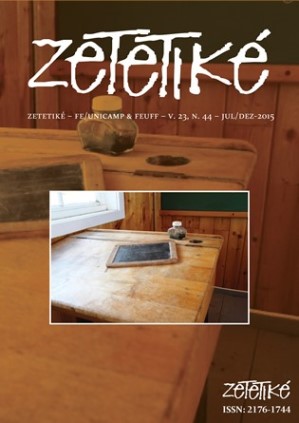Resumo
Este artigo tem como objetivo principal apresentar conceitos e teorizações que discutem as influências social, cultural e política na prática pedagógica dos professores, visto que a aquisição do conhecimento matemático, em sala de aula, pode estar relacionada com as experiências socioculturais vividas pelos alunos no ambiente no qual estão inseridos. Nesse sentido, é importante o estudo de teorias educacionais que possam auxiliar os alunos a ter acesso ao conhecimento matemático necessário para reconhecer a importância da própria cultura no desenvolvimento desse saber. Neste trabalho, são apresentados os Fundos de Conhecimento e a Pedagogia Culturalmente Relevante que, além de valorizar os conhecimentos provenientes de contextos culturais distintos, tentam, pedagogicamente, utilizar o background cultural dos alunos para desenvolver atividades curriculares que incluam e problematizem as práticas cotidianas no processo de ensino e aprendizagem em Matemática.
Referências
Azevedo Oliveira, D. P. (2012). Um estudo misto para entender as contribuições de atividades baseadas nos fundos de conhecimento e ancoradas na perspectiva sociocultural da história da matemática para a aprendizagem de funções por meio da pedagogia culturalmente rele-
vante. Dissertação de Mestrado profissional em Educação Matemática, Departamento de Matemática. Ouro Preto, MG: UFOP.
Bourdieu, P. (1997). The forms of capital. In A. H. Halsey, H. Lauder, P. Brown, & A. S. Wells (Eds.), Education: culture, economy, and society (pp. 40-58). Oxford, England: Oxford University Press.
D’Ambrosio, U. (1998). Etnomatemática: arte ou técnica de explicar ou conhecer. São Paulo, SP: Ática.
Fauvel, J., & Van Maanen, J. (2000). History in mathematics education: the ICMI study. Dordrecht, The Netherlands: Kluwer Academic Publishers.
Gandin, L. A., Diniz-Pereira, J., & Hypolito, A. M. (2002). Para além de uma educação multicultural: teoria racial crítica, pedagogia culturalmente relevante e formação docente. Entrevista com a professora Gloria Ladson-Billings. Educação & Sociedade, 23(79), 175-293.
Gay, G. (2002). Preparing for culturally responsive teaching. Jounal of Teacher Education, 53(2), 106-116.
Gerdes P. (1988). On culture, geometrical thinking and mathematics education. Educational Studies in Mathematics, 19, 137-162.
González, Z, N., Andrade, R., Civil, M., & Moll, L. C. (2001). Bridging funds of distributed knowledge: creating zones of practices in mathematics. Journal of Education for students placed at risk, 6(1-2), 115-132.
Hogg, L. (2011). Funds of knowledge: an investigation of coherence within the literature. Teaching and Teacher Education, 27(3), 666-677.
Howard, T. C. (2003). Culturally relevant pedagogy: ingredients for critical teacher reflection. Theory into Practice, 42(3), 195-202.
Ladson-Billings, G. (1995a). Toward a theory of culturally relevant pedagogy. American Educational Research Journal, 32(3), 465-491.
Ladson-Billings, G. (1995b). But that’s just good teaching: the case for culturally relevant pedagogy. Theory into Practice, 34(3), 159-165.
Ladson-Billings, G. (2006). Yes, but how do we do it? Practicing culturally relevant pedagogy. In J. Landsman, & G. Lewis (Orgs.), White teachers/diverse classrooms: a guide to building inclusive schools, promoting high expectations and eliminating racism (pp. 29-41). Hern-
don, VA: Stylus Publishing.
Moll, L. C., & Greenberg, J. B. (1990). Creating zones of possibilities: combining social contexts. Cambridge, England, Cambridge University Press.
Moll, L. C., Amanti, C., Neff, D., González, N. (1992). Funds of knowledge for teaching: using a qualitative approach to connect homes and classrooms. Theory into Practice, 31(2), 132-141.
Motta, C. D. V. B. (2006). História da matemática na educação matemática: espelho ou pintura? Dissertação de Mestrado, Faculdade de Educação. São Paulo, SP: USP.
Orey, D. C., & Rosa, M. (2008). Ethnomathematics and cultural representations: teaching in highly diverse contexts. Acta Scientiae, 10(1), 27-46.
Radford, L. , & Grenier, M. (1996). Entre les chose, les symboles et les idées... une séquence d’enseignement d’introduction à l’algébre. Revue des Sciences de L’éducation, 22(2), 253–276.
Rosa, M. (2010). The perceptions of high school leaders about English language learners (ELL): the case of mathematics. Tese de Doutorado, College of Education. Sacramento: California State University. Sacramento, CA: CSUS.
Rosa, M., & Orey, D. C. (2005a). Las raíces históricas del programa etnomatemáticas. Revista Latinoamericana de Investigacion em Matemática Educativa, 8(3), 363-377.
Rosa, M., & Orey, D. C. (2005b). Tendências atuais da etnomatemática como um programa: rumo à ação pedagógica. Zetetiké, 13(23), 121-136.
Rosa, M., & Orey, D. C. (2006). Abordagens atuais do programa etnomatemática: delinenandose um caminho para a ação pedagógica. BOLEMA, 19(26), 19-48.
Rosa, M., & Orey, D. C. (2009). Challenges faced by multicultural and multilingual schools in the United States: the case of mathematics. La Salle, 14(1), 29-44.
Sacristán, J. G. (1995). Currículo e diversidade cultural. In T. T. Silva, & A. F. B. Moreira (Orgs.), Territórios contestados: o currículo e os novos mapas políticos e culturais (pp. 83-113).Petrópolis, RJ: Vozes.
Wolff, K. H. (1966). The sociology of knowledge in the United States. Current Sociology, 15(1), 5-25.

Este trabalho está licenciado sob uma licença Creative Commons Attribution-NonCommercial-NoDerivatives 4.0 International License.
Copyright (c) 2016 Zetetiké: Revista de Educação Matemática

